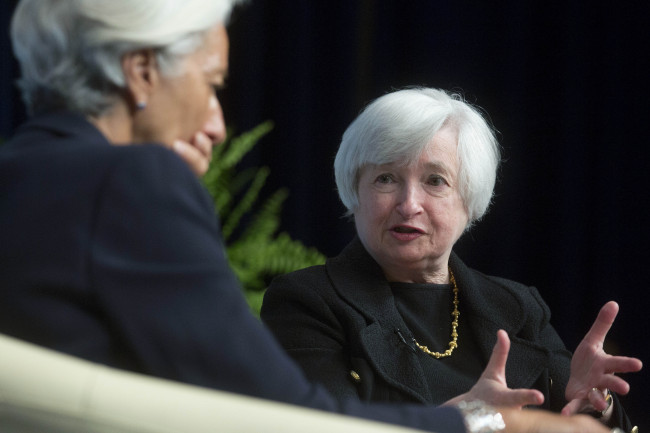WASHINGTON (AP) ― Federal Reserve Chair Janet Yellen said Wednesday that she doesn’t see a need for the Fed to start raising interest rates to defuse the risk that extremely low rates could destabilize the financial system.
Yellen said she does see “pockets” of increased risk-taking. But she said those threats could be addressed through greater use of regulatory tools. Many of those tools, such as higher capital standards for banks, were put in place after the 2008 financial crisis, which triggered the Great Recession.
In her remarks at a conference sponsored by the International Monetary Fund, Yellen disputed criticism that the Fed had contributed to the 2008 crisis by keeping rates too low earlier in the decade.
 |
Federal Reserve Chair Janet Yellen (right) speaks during a conversation with IMF Managing Director Christine Lagarde in Washington, D.C., Wednesday. (Bloomberg) |
Yellen acknowledged that financial stability risks “escalated to a dangerous level in the mid-2000s” and that policy-makers overlooked the vulnerabilities in the financial system that would make the subsequent decline in home prices so destabilizing. She included herself in this group of policymakers.
“Policymakers failed to anticipate that the reversal of the house price bubble would trigger the most significant financial crisis in the United States since the Great Depression,” Yellen said.
She said the government has made progress since then in closing the regulatory gaps that allowed the financial crisis to erupt.
Yellen spoke one day after the Dow Jones industrial average set a record for the stock market. Some critics of Fed policies have warned that the central bank could be setting the stage for another dangerous bubble by keeping rates so low for so long.
In her speech, Yellen said she didn’t see dangerous excesses in the financial system. She said that there were isolated areas of increased risk taking but that those could be dealt with through regulatory changes rather than by raising rates.
“Fed Chair Janet Yellen does not sound like she is inclined to use monetary policy to lean against potential excesses in the financial markets except as a last resort,” Dana Saporta, an economist at Credit Suisse, said in a research note.
Yellen specifically mentioned that demand for a certain type of corporate bond commonly called junk bonds is rising. She said this suggests that investors are buying those bonds in a “reach for yield” without properly assessing the risks of possible defaults. But Yellen said regulators had the tools to address rising risks in specific areas.
In a discussion after her speech with IMF Managing Director Christine Lagarde, Yellen said that she viewed regulatory efforts as the “main line of defense” to deal with threats to the stability of the financial system. She said regulators in the United States and around the globe were focusing on tightening standards in such areas as requiring increased levels of capital that banks must hold to cushion against future shocks.
Yellen said she had not taken the Fed’s control over interest rates totally off the table as a tool to deal with financial stability issues but that it was important to recognize the limitations interest-rate policies had.
She said that there were a number of areas that regulators were monitoring such as the growth of the so-called shadow banking system. In 2007 and 2008, risk-taking in a corner of shadow banking known as subprime mortgages spread to other areas of the system and eventually pushed the country into the worst recession since the Great Depression.
The Fed and other bank regulators have developed “a very active monitoring system to try to be on the lookout for the next crisis,” Yellen said.
Her comments Wednesday were in line with remarks she made at a news conference after the Fed’s June 17-18 meeting. She made clear then that the U.S. economy still needs help from the Fed’s low rates and that she saw no need to start boosting them now. Most analysts think the Fed won’t start raising its benchmark short-term rate before mid-2015.








